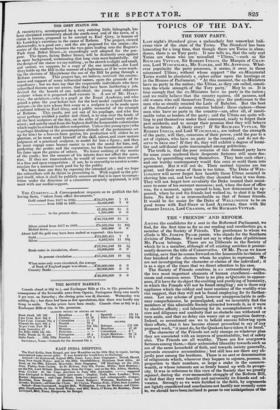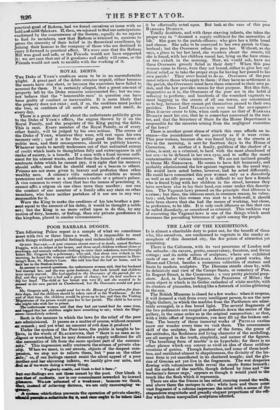THE " FRIENDS " AND REFORM.
AMONG the candidates for a seat in the Reformed Parliament, we find, for the first time as far as our reading and recollection go, a member of the Society of Friends. The gentleman to whom we allude is Mr. JOSEPH PEASE junior, who stands for the Southern division of Durham. We need not say to what class of politicians Mr. PEASE belongs. There are no Illiberals in the Society of which he is a member, although of all existing societies it preemi- nently deserves the title of Conservative. Of Mr. PEASE we know nothing, save that he comes forward on the honourable invitation of four hundred of the electors whom he aspires to represent. We are not investigating the character or claims of the individual; it is as a sign of the times that we direct attention to his case. The Society of Friends combine, in aa extraordinary degree, the two most important elements of human excellence—enthu- siasm and common sense. There is no plan so Quixotic in appear- ance, if it have for its object the exalting and purifying of humanity, in which the Friends will not be found mingling ; nor is there any appliance which the coldest and most cautious of the worldly-wise can suggest, that they will not be found employing for its further- ance. Let any scheme of good, however unapproachable to ordi- nary comprehension, be promulgated, and we invariably find the members of this admirable Society attracted towards it, as it were by elective affinity ; and labouring for its accomplishment with a care and diligence and assiduity that no obstacle can withstand or turn aside, and that no delay can weary out or opposition destroy. Indeed, so accustomed are we to behold success following upon their efforts, that it has become almost proverbial to say of any proposed work, "it must do, for the Quakers have taken it in hand.' The character of the Friends not only stamps on whatever plan they are associated with an impress of practicability, but of safety also. The Friends are all wealthy. There are few overgrown fortunes among them,—their unbounded liberality towards such as are of the same household of faith, and towards society generally, prevents excessive accumulation ; but still less are there any ab- jectly poor among the brethren. There is no sect or denomination of religionists which, wherever they happen to sojourn, possess, in proportion to their numbers, so large a stake in the common- wealth, or whose interests are so firmly bound up with its prospe- rity. It was in reference to this view of the Society that we greatly rejoiced, during the ever-memorable struggle of the Reform Bill, to find that they were heartily and universally its friends and ad- vocates. Strongly as we were fortified in the faith, by arguments not lightly considered and conclusions not hastily nor recently come to, we should have beeninclined to pause in our anticipations of the
practical good of Reform, had we-found ourselves at issue with so bold ani solid tinkers. If, then, we rejoiced to find our anticipations confirmed by the concurrence of the Society, equally do we rejoice to find its members, now that RefOrm-is attained to, anxious to prove the sincerity of their belief in its theoretical excellence, by joining their honour to the company of those who are destined to carry it forward to practical effect. We were sure that the Reform Bill was good and safe, or the Friends would not have supported it we are sure that out of it goodness and safety will come, or the Friends would not seek to meddle with the working of it.



























 Previous page
Previous page